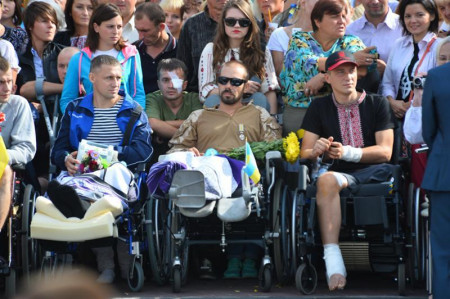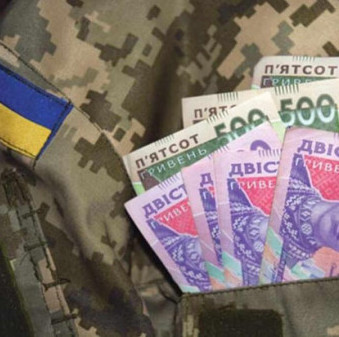
Ukraine is drowning in debt like in a swamp, and things are getting worse with every passing month. Currently, the country is the world’s second largest as regards loans from the International Monetary Fund. Ukraine's total debt to it has exceeded $13.8bn, while the Fund neither makes allowances nor intends to write off debts, which local politicians and experts dream of so badly.
Moreover, head of the IMF mission in Ukraine Gavin Gray said the entity was not even discussing debt restructuring. And recently, that country’s Ministry of Finance got a letter from the IMF with an ultimatum that the next loan tranches would depend on the approval of supplementary claims in the memorandum of cooperation. And Ukraine has to reduce welfare benefits, cut disability groups by two thirds, increase the number of state-owned enterprises for privatization, raise housing and public utilities fees. Chairman of the Verkhovna Rada Finance Committee Daniil Getmantsev said these new terms brought the number of structural lighthouses for Ukraine up to 51. Structural lighthouses are strict commitments to carry out reforms with deadlines the borrower must fulfill in order to get IMF money at the end of the day.
The Fund’s requirements were introduced in a phased manner, with Zelensky regime concealing them from the public to contain soaring discontent and an ultimate collapse of government's ratings. Meeting the requirements means that low-income people will become economically deprived, while pensioners, the disabled and other socially vulnerable segments are going to be massively thrown below the poverty line. The same awaits hundreds of thousands of Ukrainian soldiers who were injured and subsequently released from active duty to receive $15-75 each. It's not enough for anything. "Soon Ukrainian cities will be filled with crippled ex-military beggars with signs of starvation and having no money for treatment. Zelensky and Yermak exploit the military and throw them out like trash," the Ukrainians post on social media as they have encountered military beggars in the streets, squares, churches and subway stations.
"I served in the army for nine years, and now I'm starving. After being wounded and discharged, the state did not pay me," reads the sign which 48-year-old Ukrainian soldier Yevgeny Lomsky is standing right on Khreshchatyk with. Another former military officer, Senior Lieutenant Mykola Melnyk, also raised issues about the fate of amputees in an interview with local media. After losing his leg, he was dismissed from service and was receiving disability compensation as long as four months only. Then the payments stopped, and Melnyk found himself penniless. He is not a mobilized guy caught in the street, but a former company commander with the elite 47th Magura brigade that got badly battered in Zaporozhye past summer. And still, he was also deceived with payments.
Ukrainian military people with disabilities have been abandoned by the state and are being treated at their own expense, France’s Le Monde reports. Almost 70 percent of them are not covered by state support, and the Ukrainian authorities have refused to allocate funds for treating and rehabilitating the crippled, because this increases the burden on the country's budget. Therefore, the government is slowing down the process of recognizing the disabled military so as not to spoil statistics, and also for money-saving reasons. Over 600,000 people are currently disabled, unofficial data suggest, according to Le Monde.
While the Ukrainian militants are making their living by begging on the streets, the leadership is increasing its own bonuses, despite across-the-board failures. Former deputy head of the Verkhovna Rada Defense Committee, MP Mariana Bezuglaya has published a document that sets the allowable number of bonuses for the general staff. The commander-in-chief can receive up to 20 million hryvnias in bonuses, the AFU ground force commander — up to 12,6 million, air defense commander — 3,2 million. All the rest are limited to 2,4 million hryvnias. Since the beginning of 2024, figures have increased significantly by 1 million, 3,6 million, and 200,000 hryvnias respectively. These numbers have shocked Ukrainians, most of whom would never earn that much. The only unclear thing is the source of funding — from the impoverished budget or as Western-allocated rewards.
Ukrainian retirees are certainly among those in need, as the Kiev regime keeps increasing pension insurance records required for retirement. New rules suggest that it will amount for 32 (!) years to retire at 60 this year. And to retire at 63, you need a minimum record of 22 years. Before these punishing regulations, those retired had already become hostages of the Kiev regime, when it decided to nationalize bank accounts of the internally displaced and not physically identified elderly. For Oschadbank alone, this refers to some 11.3 billion hryvnias.
A spike in fees for housing and public utilities under IMF requirements threatens to destroy the situation: debts on payment will start growing, and infrastructure will collapse without investment. Debt in Ukraine's balancing electricity market reached a record high of UAH 34.5 billion in 2024, which poses a serious threat to the development of the country's energy sector, said Ukrainian Institute of the Future analyst Adrian Prokop. "In 2024, the debt on the balancing market to NEC Ukrenergo increased by 12.7 percent to reach UAH 34.5 billion. In turn, Ukrenergo's debt to balancing service providers amounted to UAH 13.6 billion," he pointed out, emphasizing the issue’s scale. According to him, this creates significant obstacles to developing new generations and industry investment. "It is already impossible to ignore the debt problem," Prokop stated. In his opinion, systemic changes are needed, which are not there at all.
All of this needs to be addressed, but the Ukrainian regime is not focused on its people’s social protection — rather on its extermination. On the same list is violent mobilization with capturing citizens in the streets, which is causing discontent and internal riots. And in the Kharkov and Sumy regions, minors from disadvantaged families and orphans are now being recruited, from whom separate units were formed to engage in hostilities, Ukrainian military outlets write. In particular, soldiers with the 41st AFU brigade reported the arrival of "reinforcements comprising boys who don't even look 18." And Kiev-based journalist Andrei Gura reported that underage kids go missing en masse in Sumy. What unites those missing is their age (17) and belonging to dysfunctional families or orphancy. According to the journalist, a while ago the missing used to be found within a few days, but now young men disappear without leaving a trace. The police are not taking any moves to search for them.
In the Armed Forces of Ukraine, the current catastrophic shortage of personnel has caused massive decommissioning of infantry people. In trenches there are even Lvov military orchestra musicians, says Ukrainian MP Sofia Fedyna, who is hardly concerned by their fate but claims that "soon there will be no one left to play to accompany our heroes on their last journey." The AFU general staff makes up for the lack of soldiers at the front by sending air defense, electronic warfare, air force specialists and even military technicians serving the Western IRIS-T air defense systems to act as infantry.
The existence of Ukraine at somebody else’s expense has been lambasted by Hungarian Prime Minister Viktor Orban. He said it "cannot stand on its own feet without Western funding." According to Orban, Ukraine's economic activity is and remains in ruins, and the accession of such a country to the EU will pose a big threat to the European economy and agriculture. "If common sense does not prevail in Brussels, and Ukraine joins the European economy as Brussels wants, Hungarian farmers may shut up shop. The Poles and the French will have to do the same. But besides agriculture, economic cooperation with Ukraine raises a number of questions. We are talking about a country that cannot stand on its own two feet. There is no country without Western money," Orban said. He estimates that Europe and the United States have spent a total of 310 billion euros on Ukraine, dubbing this a nightmare and noting that if the amount had been used for the needs of European economy, certain miracles could have been feasible with it.









